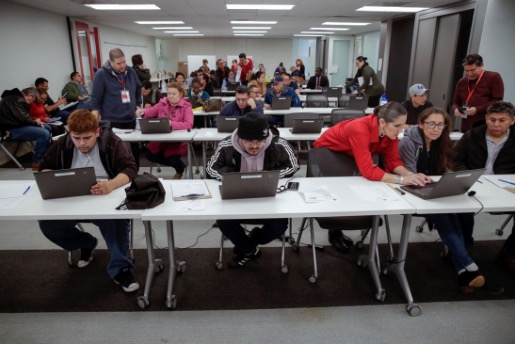CommentsCA UNEMPLOYMENT - If you get laid off, there’s a system that’s supposed to help you get by: unemployment benefits.
Whenever California stares down a pandemic or a possible recession, the partial wage-replacement program is one of the most important economic safeguards for workers.
But the benefits have become more difficult for workers to access, due to the program’s design and decisions made by California’s embattled Employment Development Department. That’s according to an in-depth report released this morning from the Legislative Analyst’s Office, a non-partisan agency that provides advice to the Legislature.
The report found that the benefits program’s orientation toward businesses — which fund the benefits and have an incentive to keep costs down — led the department to emphasize holding down costs. Pressure from the federal government to avoid errors led the department to try, however successfully, to minimize fraud.
The result: the department pursued lowering costs and hindering fraud over making it easy for workers to access benefits.
“Looked at individually, one of these policies might seem totally reasonable, either to limit fraud or or minimize business costs,” said Chas Alamo, the report’s author and principle fiscal and policy analyst with the Legislative Analyst’s office. “But when you look at them, and kind of step back and look at the suite of policies that have been made over several decades, it becomes clear that there’s a sort of imbalance in the system,” said Alamo.
Early in the COVID pandemic as joblessness rates soared, the department struggled to keep up with a surge of benefits claims— leaving some Californians repeatedly calling the department in frustration and waiting weeks or months for the money to arrive.
Then came sensational reports that the department had paid out as much as $20 billion in fraudulent benefits.
Last December, the department froze 345,000 disability insurance claims due to suspected fraud. As it tried to root out disability benefits fraud, calls to the department with questions surged, and many went unanswered.
Despite an increase in fraud during the pandemic, fraud has historically been uncommon in California’s unemployment benefits, likely “representing less than 1 percent of claims,” the report found. The vast majority of fraud that occurred during the pandemic was concentrated in a temporary federal program that has now ended.
The report lays out evidence that unemployment benefits have become too difficult for workers to access.
When workers are denied benefits, for example, they’re allowed to file appeals. The report found that more than half of denials are overturned on appeal, meaning those workers should have gotten the benefits in the first place. By contrast, “less than one-quarter are overturned in the rest of the country,” the report found.
Also slowing the process: extensive, and sometimes confusing, steps to prove eligibility for California unemployment benefits.
The department’s actions during the pandemic suggest that getting payments to workers is not its highest priority, the report said. For example, the department disqualified about 1 in 4 unemployment benefits claims during the pandemic for failing to respond to the department’s requests for additional information — or because the department was not able to process the additional information provided in the allotted time frame.
Meanwhile, a September 2020 report written by a team assembled by Gov. Gavin Newsom, found that during the same period, each department field office “had an estimated 450 pounds of unopened mail and had no system for processing unopened mail. Further, at the state’s call centers, less than 1 percent of callers reached an EDD staff member.”
The Legislative Analyst Office’s report makes over a dozen suggestions to remedy the issues it identifies, including recommendations for how to to limit improper claim denials, minimize delays and simplify benefits applications.
The report “misunderstands EDD’s recent activities to improve the process, and the deeper problems with (unemployment insurance) that go beyond the issues referenced in the report,” said former department director Michael Bernick, who is now special counsel with Duane Morris, a law firm. Bernick, who has also worked as a volunteer helping people who are trying to get benefits over the past two years, agrees that the process is too complex.
Yet many of the anti-fraud measures that the report blames for slowing down payments are required by federal protocols, Bernick wrote in an email.
“The truth is that EDD must balance rapid payout and anti-fraud — a process that has become increasingly difficult with the heightened sophistication of identity theft rings, and the amount of money going through the system,” Bernick said. He added that newer measures to combat identity theft, including the addition of online verification tool ID.me, are on the right path.
(Grace Gedye covers California’s economy for CalMatters. Previously, she was an editor at the Washington Monthly. She is a graduate of Pomona College.)






